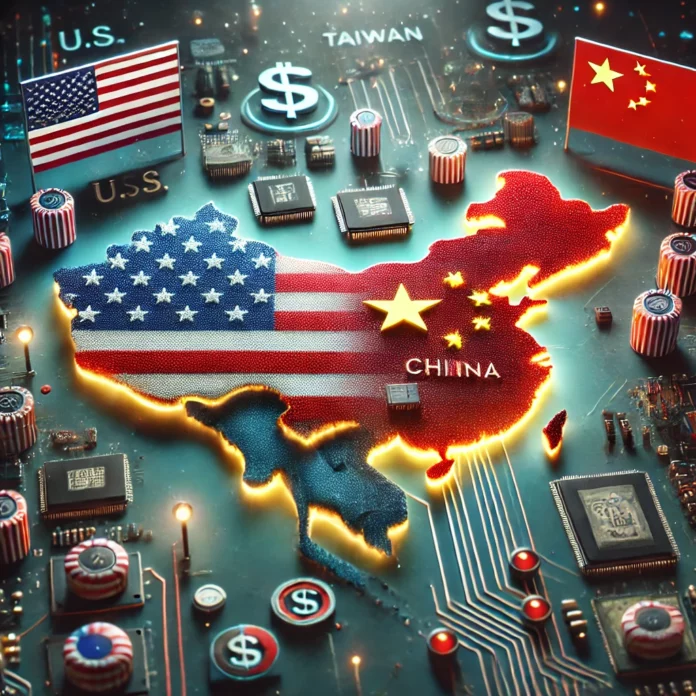Introduction: Why U.S.-China Relations Are at a Pivotal Point
As the 2024 U.S. presidential election approaches, the stakes in U.S.-China relations are rising. In a recent analysis, Danske Bank discussed how the election’s outcome could impact this complex relationship. The report reveals that regardless of the winner, the rivalry between the U.S. and China will likely intensify, especially in relation to Taiwan and the technology sector. For businesses and investors, understanding these dynamics is essential, as they could directly affect global markets, supply chains, and economic growth in both countries.
This article delves into the insights provided by Danske Bank, analyzing how a victory by either candidate—incumbent Democrat Kamala Harris or former President Donald Trump—could shape the trajectory of U.S.-China relations and what steps businesses can take to prepare for potential impacts.
The Core Issues: Taiwan and the Technology Trade War
At the heart of the U.S.-China tensions are two critical issues: Taiwan and the technology sector. The island of Taiwan, considered a “red line” by China, has long been a point of contention between the two countries. The U.S. maintains a policy of strategic ambiguity regarding Taiwan’s independence, supporting its self-defense capabilities without explicitly endorsing sovereignty. This approach prevents direct conflict while keeping China’s military ambitions in check.
Meanwhile, the technology competition has become a battleground in the U.S.-China rivalry. China’s advancements in artificial intelligence, telecommunications, and especially microchip production have heightened U.S. concerns about losing technological supremacy. Each administration’s stance on these issues could drastically alter the global economy and business landscape, especially for companies reliant on cross-border supply chains and tech exports.
Scenario 1: A Harris Victory and Continued “Managed Competition”
If Vice President Kamala Harris wins the election, analysts expect her administration to continue the “managed competition” strategy established by President Joe Biden. This approach seeks to balance competitive pressures with careful diplomacy to avoid direct confrontation with China. Harris’s potential administration would likely focus on the following key points:
- Maintaining Strategic Support for Taiwan
The Biden administration has maintained its support for Taiwan while refraining from endorsing full independence, an action that could provoke a severe Chinese response. Harris’s approach would likely uphold this careful balance, providing Taiwan with defense support without crossing China’s red line. - Boosting Technological Competitiveness
Under a Harris administration, the U.S. would continue to increase domestic investment in technology and innovation, aiming to outpace China in critical areas such as semiconductor production and artificial intelligence. This strategy is intended to reduce dependence on foreign supply chains, particularly in the microchip sector, and solidify America’s leadership in global technology. - Strengthening Alliances in the Indo-Pacific
Harris would likely strengthen partnerships with allies like Japan, South Korea, and Australia to counterbalance China’s influence. These alliances, integral to Biden’s foreign policy, are intended to maintain stability in the Indo-Pacific region and deter China’s assertive actions without direct confrontation.
Implications of a Harris Victory
For businesses, a Harris victory means a continuation of the relatively predictable policies of the Biden administration. The focus on technological innovation and domestic production may increase funding opportunities for companies in tech-related fields. However, tensions around Taiwan would likely persist, making contingency planning essential for businesses with operations in the region.
Scenario 2: A Trump Victory and Renewed U.S.-China Trade Tensions
If Donald Trump returns to the White House, the dynamics of U.S.-China relations could shift significantly. Trump’s first term was characterized by a confrontational approach, particularly through tariffs and trade restrictions. Analysts at Danske Bank suggest that a Trump victory could mean a return to these tactics, including:
- Reinstating Tariffs on Chinese Goods
Trump has consistently supported the use of tariffs as a tool to challenge China’s economic practices. If re-elected, he could impose additional tariffs on Chinese imports, reigniting the trade war that defined much of his first term. Such tariffs could drive up prices for imported goods, leading to inflationary pressures in the U.S. - Targeting Technology Exports and Supply Chains
Under Trump, the technology sector could become a central battleground, with a focus on restricting Chinese access to American technology. This would include tightening export controls on microchips and other high-tech components critical to China’s economy. Such moves could provoke retaliatory measures from China, such as limiting exports of rare earth minerals vital to tech manufacturing. - A More Transactional Stance on Taiwan
Trump’s previous statements on Taiwan suggest he views the island as a potential bargaining chip in negotiations with China. This transactional approach could create uncertainty for Taiwan’s tech industry, especially its semiconductor sector, which is a key player in the global supply chain. A shift in U.S. policy on Taiwan could increase instability in the region.
Implications of a Trump Victory
A Trump victory would likely lead to increased volatility in U.S.-China relations, affecting global supply chains and creating potential inflationary pressures. Businesses reliant on Chinese imports, or those with significant Chinese operations, would need to prepare for renewed tariffs and supply chain disruptions. Additionally, companies in the technology sector could face tighter export controls, limiting access to the Chinese market.
Taiwan as a Flashpoint: Why It Matters
Taiwan’s significance in U.S.-China relations extends beyond geopolitical considerations; it is a key player in the technology sector, particularly in semiconductor manufacturing. Taiwan Semiconductor Manufacturing Company (TSMC), the world’s leading semiconductor manufacturer, supplies essential components for everything from smartphones to military equipment.
For the U.S., maintaining Taiwan’s stability is critical to securing its technology supply chain. However, China views Taiwan as part of its territory and has repeatedly expressed its intent to reunify the island with the mainland. The U.S. policy of strategic ambiguity has so far prevented escalation, but any significant shift in this policy could provoke a response from China.
With the semiconductor industry at the heart of this issue, any disruption in Taiwan’s supply chain could have significant global repercussions. Businesses worldwide, especially in the tech and electronics sectors, need to monitor developments closely and consider diversification strategies to mitigate risks.
Preparing for Business Disruptions: Steps to Take
Regardless of the election outcome, U.S.-China tensions are likely to continue. Companies with exposure to either market should prepare for potential disruptions by implementing the following strategies:
- Diversifying Supply Chains
Shifting supply chains away from China, or adding alternative suppliers in other countries, can reduce dependency on Chinese manufacturing. For example, some companies have moved operations to Southeast Asia to mitigate risks associated with U.S.-China tensions. - Developing Contingency Plans for Tariffs and Trade Restrictions
Tariff increases or new trade restrictions could occur under a Trump administration. Businesses should evaluate their supply chains and consider potential cost increases, exploring options to absorb or offset these costs. - Monitoring Currency and Inflation Risks
Renewed trade tensions may weaken the Chinese Yuan while adding inflationary pressures to the U.S. dollar. Companies that rely on currency stability should consider hedging options and monitor exchange rate forecasts to manage financial risks. - Investing in Technology and Domestic Production
Both candidates are expected to prioritize domestic technology investment. Businesses involved in tech or manufacturing can benefit from increased federal funding by investing in domestic capabilities, particularly in semiconductor manufacturing and artificial intelligence. - Establishing Crisis Management and Communication Plans
An unexpected escalation in Taiwan or the South China Sea could have significant ramifications. Businesses with exposure to the region should prepare crisis communication plans to reassure stakeholders, including customers, investors, and employees.
Conclusion: The Path Forward for U.S.-China Relations and Business Resilience
The 2024 U.S. presidential election will undoubtedly shape the future of U.S.-China relations, with Taiwan and technology as central issues. While a Harris administration would likely maintain a balanced approach to competition, Trump’s return could lead to a resurgence of aggressive trade policies. For businesses, this means preparing for volatility in supply chains, tariffs, and currency fluctuations.
As Danske Bank’s report advises, companies should be proactive in building resilience to manage risks associated with this complex geopolitical landscape. By diversifying supply chains, planning for tariff impacts, and staying informed about policy shifts, businesses can better navigate the challenges posed by intensified U.S.-China competition.
In an increasingly interconnected world, understanding and preparing for these dynamics will be crucial for maintaining stability and growth in an unpredictable environment.


